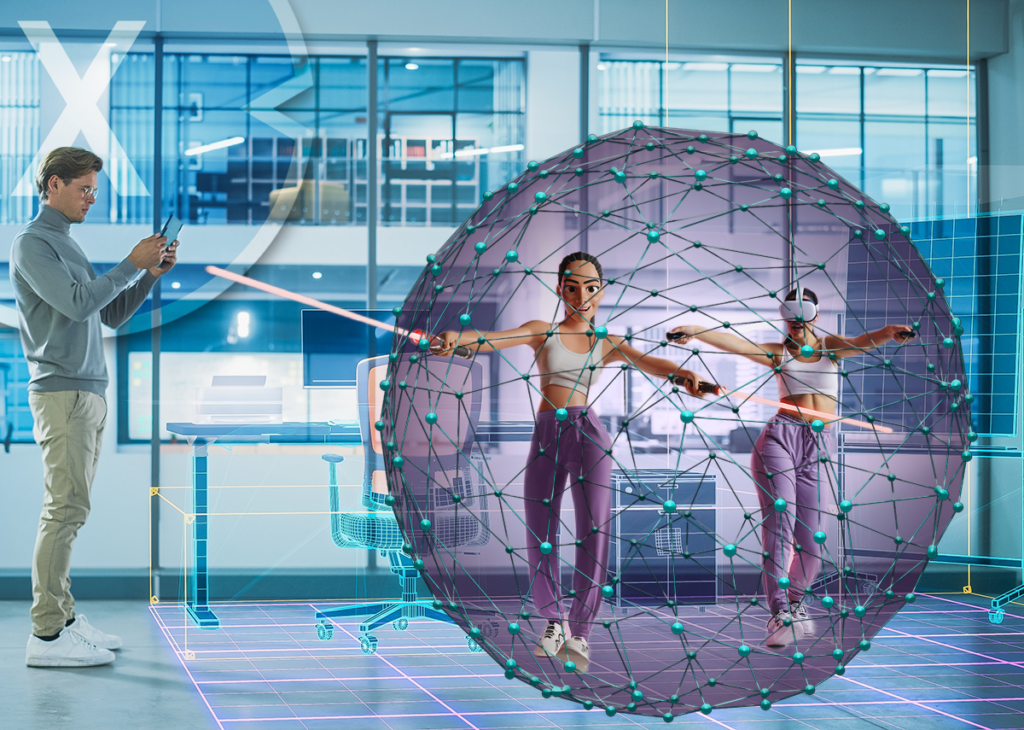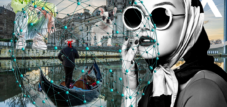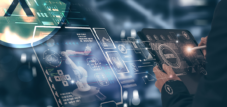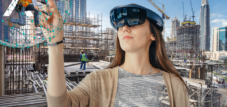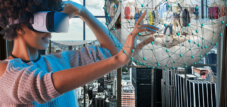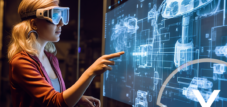Internet of Experience (IoE): thinking beyond the Industrial Metaverse: What happens next? I Post Internet of Gemini | Metaphysics & Meta-Philosophy
Language selection 📢
Published on: October 20, 2023 / Update from: October 20, 2023 - Author: Konrad Wolfenstein
This is still an unfinished beta version
🌐 The Internet of Experiences (IoE) - The evolution beyond the Industrial Metaverse
Technological development is a continuous process that constantly presents us with new challenges and opportunities. Today we still encounter partly futuristic, partly realistic concepts such as Industry 4.0, the Internet of Things (IoT) and the Industrial Metaverse, in which XR (Extended Reality) and Digital Twins technologies play a central role. These topics mark temporary milestones in our technological development and thinking, but what happens beyond that?
🌟 The transition from digital twins to the era of the “Internet of Experiences” (IOE)
Digital twins are virtual replicas of real entities, be they physical objects, processes, systems or their complex connections. They are already widely used in companies for practical purposes such as system simulation, monitoring and maintenance, all without direct interaction with their physical counterparts.
However, the industrial meta persons are ready to raise the concept of digital twins to a completely new level. This transition marks the change from the Internet of Things, in which data between sensors flow in tangible objects via networks, to the “Internet of the twins.” This creates a synergy between digital entities and the flow of information that opens up an additional dimension.
Within this “Internet of the twins”, employees will take part in extensive co-design and co simulation processes. Imagine a factory in which equipment, products and staff are seamlessly connected. The operations of these elements and their behavior can be dynamically simulated in a virtual environment.
Employees will experience immersive representations of their work environments. Unlike the static consumer metaverses, these dynamic industrial metaverses will promote collaboration between different digital twins and their associated simulations.
When working in this dynamic world of systems and data, teams will develop solutions for the challenges that they face. This networked meta verse, which includes both machines and human interactions, will form the basis for a new era that we call the “Internet of Experience”.
🌍 The essence of the Internet of Experiences
The “Internet of Experience” (IOE) will represent a revolution in the way we interact, learn and solve problems. It goes far beyond the mere digital reproduction of physical objects. Here are some key aspects of the IOE:
1. Interaction in an augmented reality
In the IoE, the boundaries between the digital and physical worlds will continue to blur. People will be able to interact in augmented realities that merge real and virtual elements. This will fundamentally change the way we work, play and learn.
2. Immersive learning opportunities
Education will benefit significantly from the capabilities of the IoE. Students can immerse themselves in virtual worlds to experience and understand complex concepts. This enables deeper understanding and promotes creative thinking.
3. Real-time solution finding
In IoE, teams can collaborate in virtual environments to solve real-world problems in real time. This accelerates innovation processes and improves efficiency in various industries, from manufacturing to medicine.
4. Personalized experiences
The IoE will enable personalized experiences. Whether in healthcare, retail or entertainment, products and services are tailored to users' individual needs and preferences.
5. Ethical and privacy issues
With the integration of IoT devices and the collection of extensive data in the IoE, ethical and data protection issues also arise. User security and privacy must be guaranteed while developing innovative applications.
6. Economic impact
The IoE will impact the economy in many ways. New business opportunities will emerge, existing industries will transform, and the way goods and services are produced and distributed will change.
🏭 The reality of IoE in various industries
The IoE will manifest itself in various industries and offer numerous fields of application:
1. Healthcare
In healthcare, IoE will help improve diagnoses, promote telemedicine and create personalized treatment plans. Patients will be able to monitor real-time health data and interact with healthcare professionals without having to be physically there.
2. Education
In education, virtual classrooms and immersive learning environments will become the norm. Students can experience historical events, conduct science experiments, and understand complex concepts in ways not possible in traditional schools.
3. Manufacturing
In the manufacturing industry, IoE will optimize production and improve asset maintenance. Machines will communicate with each other to ensure efficient operations and report maintenance needs in a timely manner to minimize downtime.
4. Entertainment
The entertainment industry is being revolutionized by the IoE. Virtual reality (VR) and augmented reality (AR) will offer immersive experiences, be it in video games, films or live events. Viewers will be part of the action and be able to make their own decisions.
5. Retail
In retail, IoE will create personalized shopping experiences. Stores will create digital twins of customers to understand their preferences and offer tailored offers.
6. Transport and logistics
The IoE will make transport and logistics more efficient. Autonomous vehicles will share information in real time to avoid traffic jams and deliver deliveries on time.
🔍 The challenges of the IoE
Despite its enormous potential, the IoE also brings with it challenges:
1. Data security and data protection
With the constant collection and transmission of data, the risks in terms of data security and data protection increase. Companies must implement robust security measures to protect their customers' data.
2. Interoperability
The integration of different technologies and platforms in the IoE requires a high level of interoperability. Standards and protocols must be developed to enable seamless communication between different systems.
3. Ethics and Regulation
The ethical aspects of the IoE, such as the responsible use of data and the avoidance of discrimination, must be addressed. A clear legal framework is needed to ensure that the IoE functions in accordance with ethical standards.
4. Education and training
The introduction of IoE requires extensive training of professionals so that they can effectively use the new technologies. This not only affects IT professionals, but also workers in various industries.
🚀 Technological development
The Internet of Experiences (IoE) is upon us as an exciting new era in technological development. It will fundamentally change the way we work, learn, communicate and solve problems. The integration of digital twins into virtual worlds will create a synergy between digital entities and information that goes far beyond the current understanding of technology.
While the IoE offers immense potential, the associated challenges and issues must also be considered, particularly with regard to data protection, ethics and education. Responsible and sustainable development of the IoE will be critical to fully realize the benefits of this exciting new era while protecting the integrity and privacy of users. 🌟🌐🏭🔍🚀
📣 Similar topics
- 🌟 The Future of Technology: The Internet of Experiences
- 🌍 IoE: Interactive realities and their implications
- 🏭 The Industrial Metaverse: A New Era of IoE
- 🔍 Challenges in the Internet of Experiences
- 🚀 The IoE revolution: changing technological development
- 🌐 Digital Twins and the emergence of IoE
- 🏥 IoE in Healthcare: Diagnostics and Telemedicine
- 🎓 Education on the Internet of Experiences: Virtual Classrooms
- 🛒 Retail in the age of IoE: Personalized shopping experiences
- 🚗 IoE in transport and logistics: increasing efficiency and autonomous driving
#️⃣ Hashtags: #InternetofExperiences #IoE #TechnologicalDevelopment #DigitalTwins #Challenges #Revolution #Healthcare #Education #Retail #TransportationandLogistics
🌐 Post Internet of Gemini
The “Post Internet” describes an era in which the Internet is no longer just a tool or novelty, but is firmly integrated into our everyday life. It is not just a place we are going to search for information or chat with friends, but also forms our culture, our economy and our social relationships. It has revolutionized the way we live, work and play.
👥 The concept of “twins” was created in this new era of the “Post Internet”. These are not human twins, but digital duplicates of real objects or systems. These digital twins, also known as “digital twins”, are virtual representations of physical objects and processes. They enable us to simulate, analyze and optimize complex systems in real time.
🚗 Imagine if a car manufacturer could create a digital twin of a car and run various tests without ever having to build a physical prototype. Or an architect could design, test and optimize a building in a virtual environment before the first brick is laid.
🔍 But how do these digital twins work? They combine data from various sources, including sensors, cameras, and other sources of information, to create a detailed, dynamic model of a physical object or system. This model can then be used to simulate different scenarios, make predictions and make optimizations.
🏭 Another area where digital twins play an important role is Industry 4.0. This is the next phase of the industrial revolution, characterized by the introduction of smart manufacturing and the networking of machines, inventories and production facilities. With the help of digital twins, companies can monitor their production processes in real time, identify problems and find solutions before they become larger problems.
🌐 But it's not just companies that benefit from digital twins. They are also used in medicine, urban development and many other areas to make better, more informed decisions.
🌍 Overall, the era of the “Post Internet” marks the transition from a time when the Internet was a separate, often misunderstood tool, at a time when it is deeply integrated into our daily life. The introduction of technologies such as digital twins shows how much our physical and digital world are merged with each other and how they work together to shape our future.
🔍 “Post” is a prefix of Latin origin and means “after” or “behind”. In many contexts, it is used to point out something that comes after a certain time or event. For example:
- Postmodernism: A cultural, artistic, literary, and philosophical trend that asserts that there are no longer any universal narratives or truths in the modern world. It follows modernism and is characterized by a skeptical or cynical view of many of the assumptions of Western culture.
- Post-production: The process in film and video production that occurs after filming, such as editing, color correction and sound design.
- Post-traumatic stress disorder: A mental illness that occurs after a traumatic event.
🌐 In the “age of the post-internet”, “Post” indicates that it is a time that follows the introduction and general acceptance of the Internet, with new technologies or paradigms that go beyond the traditional understanding of the Internet.
📣 Similar topics
- 🌐 The era of the “Post Internet”: Integration into our everyday life
- 🖥️ Digital Twins: Virtual representations of reality
- 🏭 Industry 4.0: Digital Twins in Smart Manufacturing
- 💡 The versatile application of Digital Twins
- 🌆 Urban planning in the “Post Internet” age
- 🏥 The role of digital twins in medicine
- 🚗 Automotive industry and the future of prototype development
- 🔮 Visions of the future: How digital twins shape our world
- 🔄 The fusion of physical and digital reality
- 💬 The importance of the prefix “post” in the “Post Internet” age
#️⃣ Hashtags: #PostInternet #DigitalTwins #Industrie40 #Futuretechnologies #MergingofWorlds
📚 Metaphysics and meta-philosophy
📚 Metaphysics and Meta-Philosophy in the Post-Internet Age: A Look at Industry 4.0, the Evolving Metaverse, and the Emerging Internet of Experience.
🌐 In recent decades, technology and digital developments have greatly influenced our understanding of reality, existence and knowledge. This inevitably has profound implications for metaphysics and meta-philosophy, two central areas of philosophy.
🔮 Metaphysics traditionally deals with questions about the nature of reality and existence. What really exists? What is the nature of time and space? In today's world, when digital and virtual worlds are becoming more and more important, these questions are becoming increasingly complex.
💻 The post-Internet era refers to a period after the boom of the Internet, when digital technologies have penetrated deeply into our daily lives, influencing our behavior, way of thinking and our perception of reality. The Internet has already revolutionized the way we communicate, work, play and think.
🏭 Industry 4.0 stands for the fourth industrial revolution and is characterized by digitalization. Smart data, automation and artificial intelligence play a central role. The boundaries between the physical and digital worlds are blurring, raising new metaphysical and philosophical questions.
🌌 The metaverse is a term that is often used to describe a collective virtual divided space, created by the convergence of physically virtual reality and interactive digital space. It about the question of whether experience in metavers is less “real” than an experience in the physical world. How do such virtual experiences influence our understanding of self, existence and reality?
🌐 The Internet of Experience is a concept that goes beyond the Internet of Things. It's about how technology can create immersive, personalized and seamless experiences for users. In a world where experiences can be digitally curated and optimized, what does this mean for our understanding of authenticity and truth?
🤔 Meta-philosophy, thinking about the nature of philosophy itself, also faces new challenges. How do we deal with the rapidly changing technological landscape and integrate it into our philosophical thinking? Are traditional philosophical methods and approaches still relevant or do we need to find new ways to understand and interpret these digital developments?
🔍 The rapid development of digital technologies and the merging of physical and virtual realities challenge our metaphysical and philosophical thinking. We face new questions about the nature of reality, existence and knowledge that have not yet been fully answered. It's an exciting time for philosophers, thinkers and anyone curious to delve deeper into the nature of our ever-changing world.
📣 Similar topics
- 🌌 Metaphysics in the digital age: New realities and existential questions
- 🚀 The Post-Internet Age: Digital Transformation and Philosophical Reflection
- 🏭 Industry 4.0 and the metaphysical fusion of realities
- 🌐 The Metaverse Revolution: Virtual Experiences and Their Importance
- 🌟 The Internet of Experience: Authenticity in a digital world
- 🤔 Meta-Philosophy in Transition: Philosophizing in the Era of Technology
- 💻 Digitalization and the search for metaphysical truth
- 🌄 Virtual vs. Physical Reality: A Metaphysical Debate
- 🌌 The Metaphysics of the Metaverse: Existence Beyond Limits
- 🤯 Philosophy in the era of the Internet of Experience: New ways of thinking
#️⃣ Hashtags: #Metaphysics #PostInternet #Industrie40 #Metaverse #InternetOfExperience #MetaPhilosophy
🗒️ Xpert.Digital: A pioneer in the field of extended and augmented reality
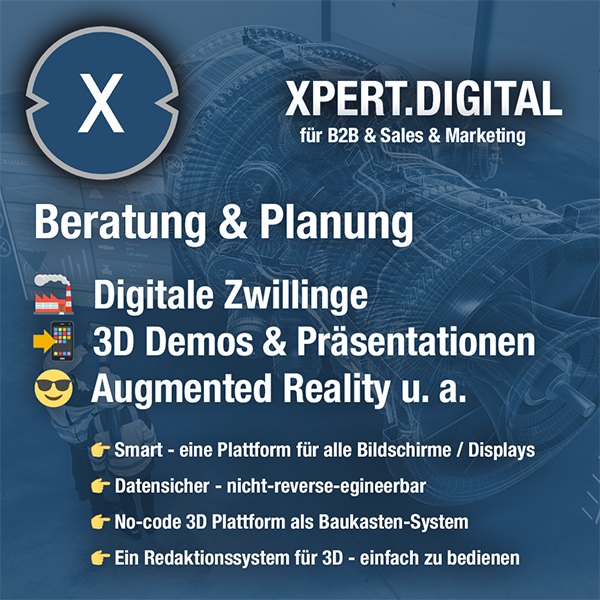
We are there for you - advice - planning - implementation - project management
Xpert.Digital - Pioneer Business Development
Smart Glasses & KI - XR/AR/VR/MR industry expert
Consumer metaverse or meta -verse in general
If you have any questions, further information and advice, please feel free to contact me at any time.
I would be happy to serve as your personal advisor.
You can contact me by filling out the contact form below or simply call me on +49 89 89 674 804 (Munich) .
I'm looking forward to our joint project.
Xpert.Digital - Konrad Wolfenstein
Xpert.Digital is a hub for industry with a focus on digitalization, mechanical engineering, logistics/intralogistics and photovoltaics.
With our 360° business development solution, we support well-known companies from new business to after sales.
Market intelligence, smarketing, marketing automation, content development, PR, mail campaigns, personalized social media and lead nurturing are part of our digital tools.
You can find out more at: www.xpert.digital - www.xpert.solar - www.xpert.plus




